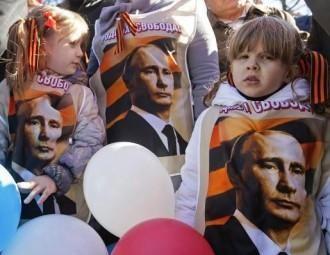Ahead of president campaign 2015 Belarus’ propaganda seeks to toughen information control

Though the state didn’t manage to neutralize Russia’s aggressive propaganda campaign, Belarus’ state media are developing mechanisms to reduce the influence of Russian media in shaping public opinion.
Amid events in Ukraine, the Belarusan authorities seek to increase control over the Belarusan information space. Belarusan media were unprepared to counteract Russian propaganda, and to shape and promote their own position concerning the Russo-Ukrainian crisis.
A statement made by the Russian Ambassador to Belarus, Alexander Surikov, was indicative of this situation. In his opinion, Lukashenka’s position as regards the Russo-Ukrainian crisis differs from that of Belarusan public opinion.
Russia’s anti-Ukrainian propaganda in the media has undoubtedly had a significant influence on Belarusan public opinion, which supports Russian aggression in Ukraine. According to opinion polls survey by IISEPS, in March Lukashenka’s popular rating increased amid events in Ukraine, however, this growth was influenced by euphoria about Russia’s annexation of Crimea.
Despite the fact that President Lukashenka has repeatedly voiced his stance on the Russo-Ukrainian crisis, which differs from Russia’s position, the Belarusan state media have been unable to make it dominant in Belarus’ public space.
In addition, the Belarusan authorities are beginning to realise that the Kremlin no longer controls the increasing imperialistic ambitions in Russian society and the growing demand for its expansionist policy, especially with regard to Ukraine. Even the editor of the largest state-run newspaper in Belarus, Pavel Yakubovich, rather sharply commented on the war hysteria stirring up in Russian society, “teach a fool to bow with grace and he would fall flat on his face. Those who had the patience on Tuesday night to watch the Moscow programme ‘Special Correspondent’ with Mamontov to the very end could verify the accuracy of the aphorism”. The voiced criticism of the Russian position on Ukraine in the Belarusan state media was certainly coordinated with the Belarusan authorities.
Simultaneously, the Belarusan leadership has begun to review the state information policy and is reshuffling information managers. For example, Lukashenka dismissed the Information Minister Proleskovsky and replaced the spokesperson in his Administration.
In addition, state-run media have started a series of publications about Belarus’ long-term development prospects. For example, Presidential Aide Rudy proposed to revise the socio-economic model, which no longer ensured development: “I believe that to advance development, it is important not only to increase competitiveness of old industries, but also to collect fruits from the new ones”.
Ahead of the 2015 Presidential campaign, the Belarusan authorities will attempt to weaken the Russian media’s influence in Belarus and will revise the state media’s information policy, allowing for some pluralism in a public debate about socio-economic development. However, the environment for the independent media will not be mitigated or changed.
Solidarity with Belarus Information Office
-
03.01
-
07.10
-
22.09
-
17.08
-
12.08
-
30.09








































